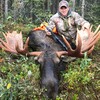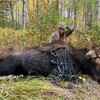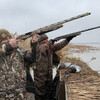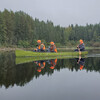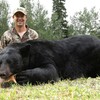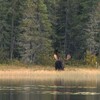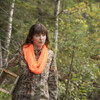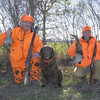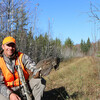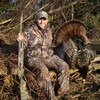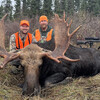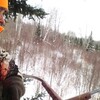Ground Blind Hunting for Deer
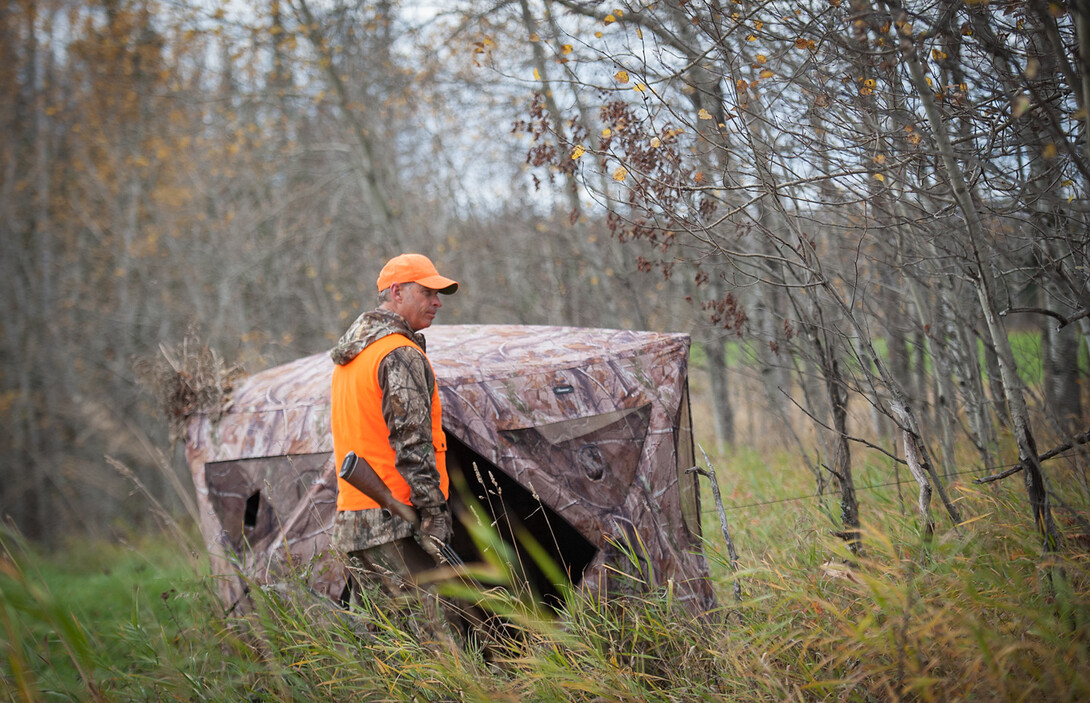
While most Ontario deer hunters are quite familiar with tree stands, far fewer have embraced the concept of the ground blind. Tree stands have the advantage of getting the hunter off the ground. There are many advantages to a bird's-eye view of the deer's world. Yet in several situations hunters routinely face in this province, ground blinds are the best option. Ground blinds are warmer than a tree stand and a whole lot easier to get in and out of. They are also, arguably, a safer choice than a tree stand. You don't hear much about people falling out of ground blinds.
Ground blinds are useful in a variety of deer hunting circumstances. In open country, such as fields, swamps, and cut-over areas, they remove the chance of a hunter silhouette and obscure movement. Oddly enough, deer seem to ignore unusual blocky or round shapes that miraculously appear in the bush. The whitetail deer reaction to the human outline is far less nonchalant. Some ground blinds also use scent-absorbing materials that make it difficult for deer to wind the hunter. In windy or rainy conditions, a covered ground blind allows you to stay put comfortably and for a longer period of time.
Ground blinds also allow you to take rest and adjust yourself for a shot without being detected, and you can use a comfortable seat while waiting for a deer to approach. This comfort is much appreciated, especially if you've spent any time all sitting on stumps, rocks, or tree stand seats the size of a pizza slice. If you are on the deer grounds with an apprentice hunter who may have trouble keeping still -- ground blinds are especially good.
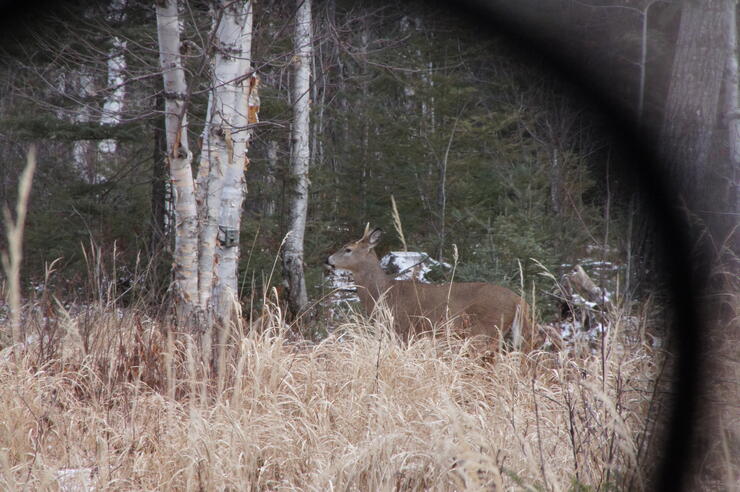
There is a wide variety of ground blinds deer hunters can use in Ontario, from purely natural designs to elaborate commercial pop-ups. All have a place in the Ontario deer hunter's bag of tricks. A natural ground blind can be constructed of just a few materials found in the forest. The best natural ground blinds are built around large elements like a boulder, trees, shrubs, or slash piles. The ground blind should cover your movement but still allow a free shot with a minimum of noise. It is critical that you have a couple of good shooting lanes when you pick your site. These shooting lanes should include some in the directions you may not have considered as key spots. This is true whether you are rifle or bow hunting with a ground blind. Deer have a habit of sneaking in where you least expect.
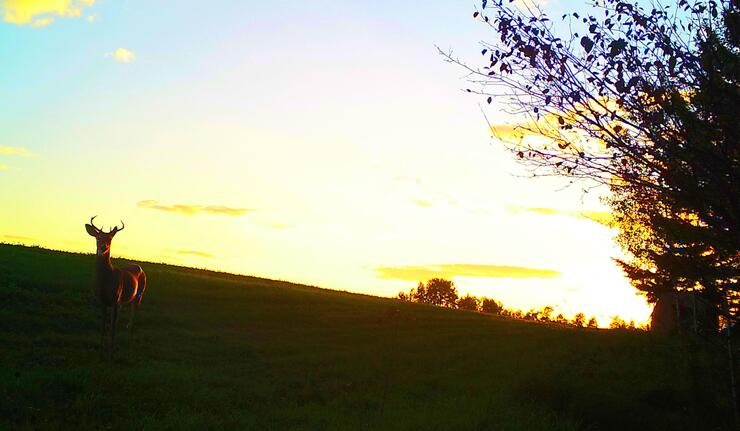
The most common commercially available blinds are the hub or pop-up tent style. Commercial pop-up tents are relatively affordable these days, ranging from $100 to $600. There are a staggering number of blinds on the market, from push-out models to folding designs and classic dome tents. Ground blinds come in a wide variety of camouflage patterns and usually have several zippered or Velcro windows for viewing and shooting out of at least one door. If the commercial ground blind is going to be left on private land, it will need to be staked or tied down. It's amazing what a bit of autumn wind can do to a tent that's not properly anchored.
Some folks consider ground blinds something of a novelty and not really the domain of serious hunters. However, two of the largest bucks I've ever laid eyes on were dispatched during a ground blind hunt. Several years ago, my father, Gord Ellis Sr., his two grandsons, and this writer were all hunting mixed brush farmland in Emo, Ontario. My oldest son Devin and I were in a slightly elevated blind overlooking an alfalfa field, while my youngest son Austin and Gord Sr. were in a camouflaged ground blind on an old trail in the bush behind us. Through several openings in the blind, they had a perfect view of two tree lines and a half dozen well-stomped deer trails. The blind allowed them to sit in the relatively open country without giving the deer anything to worry about. Early in the morning, we heard a couple of shots. After a time, Austin came on the radio.
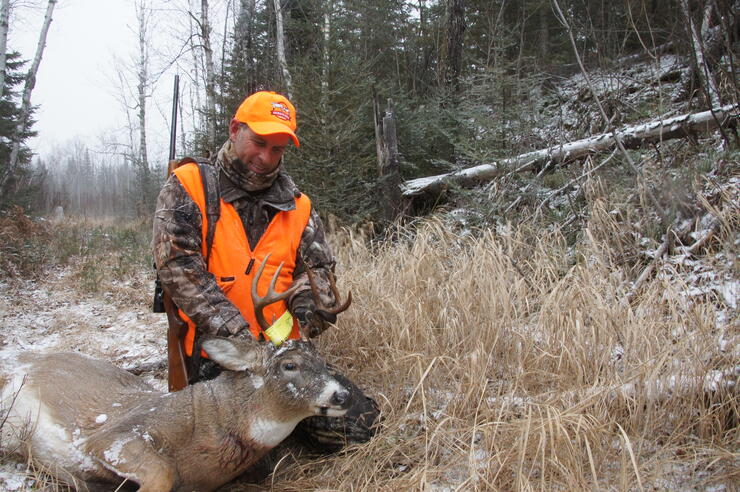
"One doe down," he said. Another hour went by. Then more shots. We had to go check. As Devin and I walked to the pop-up blind, we could see that all sorts of excitement were underway. Turned out that my dad had seen two bucks fighting. He shot at one, and it fell. Yet the other deer did not run. In fact, the big buck started to drag the dead one away. They were locked at the antlers. Since we had my buck tag as well, Dad dispatched the second deer. By the time Devin and I got there, both the 13-point and 10-point bucks were down. That was a three-deer morning. Needless to say, Gord Sr. has become a believer in ground blinds.
Ground blinds of all types are a great tool for hunting whitetail deer in Ontario's varied habitat. You really should try one.
Recommended Articles
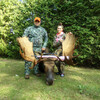
Ontario's Largest Moose by a Female
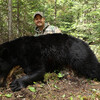
Thunderstock Outfitters Spring Black Bear Hunt
Is an All Day Deer Hunt Worth It?
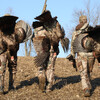
Beasley Brothers' Triple
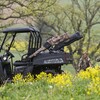
A Guide to Big Game Hunting with ATVs
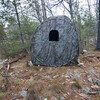
Ground Blind Hunting
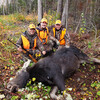
Techniques for an Ontario Moose Hunt
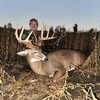
The Best Trophies Are The Ones Shared With Family

Deer in The Deep North

Enjoying Wild Game
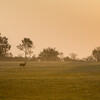
Spot and Stalk
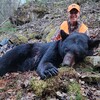
Dog Lake Bears

Flushing in Norfolk

Fall Moose Hunting
Big Ontario Bull Moose at 8 Yards
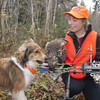
Archery Grouse

Marten River Bear
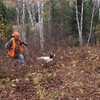
Black Bear Camp

Bird Dog Friendly Lodges
